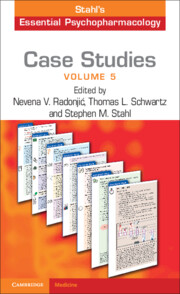Book contents
- Case Studies: Stahl’s Essential Psychopharmacology
- Case Studies: Stahl’s Essential Psychopharmacology
- Copyright page
- Contents
- Introduction
- Contributors
- List of icons
- Abbreviations
- Case 1: Usage of esketamine spray for treatment-resistant major depressive disorder (MDD)
- Case 2: The man who is confused about his identity
- Case 3: Propane, shattered glass, and parasites
- Case 4: Hit by a car
- Case 5: Caring for the whole person
- Case 6: The man whom clozapine (Clozaril) could not touch
- Case 7: Where did her period go?
- Case 8: To dopamine or not to dopamine, that is the question
- Case 9: The one that came out of nowhere
- Case 10: Darth Vaper strikes again
- Case 11: First-time Mom’s struggle with postpartum post-traumatic stress disorder (PTSD)
- Case 12: Why so down?
- Case 13: It’s confusing, isn’t it?
- Case 14: The adolescent who just can’t stay awake
- Case 15: The lady with bipolar disorder (BP), borderline personality disorder (BPD), and myasthenia gravis (MG)
- Case 16: Spending money does not make a bipolar diagnosis
- Case 17: Pain makes me anxious, and anxiety gives me pain
- Case 18: The woman who couldn’t focus
- Case 19: The gentleman with sudden onset of akathisia on clozapine (Clozaril)
- Case 20: The pregnancy blues
- Case 21: The menopause blues
- Case 22: The lady who felt “funny” on the medication
- Case 23: Two ladies with bruises
- Case 24: The lady who was afraid for her kids
- Case 25: The woman whose kidneys could not handle lithium
- Case 26: The gentleman who was sober and could not focus
- Case 27: When the music does not stop
- Case 28: The man who tried to get it right
- Index of drug names
- Index of case studies
- References
Case 27: - When the music does not stop
Published online by Cambridge University Press: 03 April 2024
- Case Studies: Stahl’s Essential Psychopharmacology
- Case Studies: Stahl’s Essential Psychopharmacology
- Copyright page
- Contents
- Introduction
- Contributors
- List of icons
- Abbreviations
- Case 1: Usage of esketamine spray for treatment-resistant major depressive disorder (MDD)
- Case 2: The man who is confused about his identity
- Case 3: Propane, shattered glass, and parasites
- Case 4: Hit by a car
- Case 5: Caring for the whole person
- Case 6: The man whom clozapine (Clozaril) could not touch
- Case 7: Where did her period go?
- Case 8: To dopamine or not to dopamine, that is the question
- Case 9: The one that came out of nowhere
- Case 10: Darth Vaper strikes again
- Case 11: First-time Mom’s struggle with postpartum post-traumatic stress disorder (PTSD)
- Case 12: Why so down?
- Case 13: It’s confusing, isn’t it?
- Case 14: The adolescent who just can’t stay awake
- Case 15: The lady with bipolar disorder (BP), borderline personality disorder (BPD), and myasthenia gravis (MG)
- Case 16: Spending money does not make a bipolar diagnosis
- Case 17: Pain makes me anxious, and anxiety gives me pain
- Case 18: The woman who couldn’t focus
- Case 19: The gentleman with sudden onset of akathisia on clozapine (Clozaril)
- Case 20: The pregnancy blues
- Case 21: The menopause blues
- Case 22: The lady who felt “funny” on the medication
- Case 23: Two ladies with bruises
- Case 24: The lady who was afraid for her kids
- Case 25: The woman whose kidneys could not handle lithium
- Case 26: The gentleman who was sober and could not focus
- Case 27: When the music does not stop
- Case 28: The man who tried to get it right
- Index of drug names
- Index of case studies
- References
Summary
Which of the following hypnotic medications has the shortest half-life?
Keywords
- Type
- Chapter
- Information
- Case Studies: Stahl's Essential Psychopharmacology , pp. 453 - 468Publisher: Cambridge University PressPrint publication year: 2024

